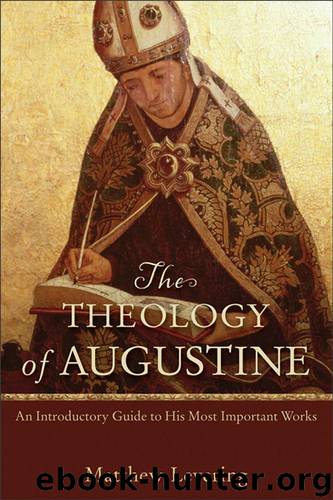Theology of Augustine, The: An Introductory Guide to His Most Important Works by Matthew Levering

Author:Matthew Levering
Language: eng
Format: azw3
Tags: a Manichean (by St. Augustine), On Chritian Doctrine (by St. Augustine), Confessions (by St. Augustine), Works of Augustine, Bishop of Hippo, City of God (by St. Augustine), Homilies on the First Epistle of John (by St. Augustine), On the Trinity (by St Augustine), On the Predestination of the Saints (by St. Augustine), Saint Augustine, Augustine's theology, Answer to Faustus, REL067000, St. Augustine
ISBN: 9781441240453
Publisher: Baker Publishing Group
Published: 2013-03-15T00:00:00+00:00
Books 11–14
Books 1–5 showed that the worship of anthropomorphic gods tragically constricted human ends, while Books 6–10 argued that the best pagan philosophy, that of Plato and his followers, recognized the eternal and transcendent God in whose wisdom and beauty everything participates but failed to appreciate the true path to participation in God—namely, the embodied path of Christ’s humility. Books 11–14 turn to the roots of the Christian understanding of history, Scripture’s teaching that God is the Creator. What is included in this biblical understanding of reality as created?
For Augustine, Scripture, while written by humans, “is manifestly due to the guiding power of God’s supreme providence, and exercises sovereign authority over the literature of all mankind.”[295] Scripture proclaims that God wills humans to enter into communion with him. Those who, by the grace of God, love God above all things compose his eternal City. Yet the human mind and heart have turned away from God, so that we are in desperate need of renewal. The path to the City of God is the humility that comes from the mediator who is the Word incarnate. Since God makes us in his image, humans can know by philosophical reasoning that God exists and that everything else is God’s creation. But without renewal and elevation by grace, humans cannot know how God intends for us to be united to him. The mediator is the path, and God teaches us about this path through Scripture, which consists of “writings of outstanding authority in which we put our trust concerning those things which we need to know for our good, and yet are incapable of discovering for ourselves.”[296] These things are the realities of creation and salvation.
The world has a temporal beginning. Augustine explains that time and space did not exist prior to the creation of the world; there was simply God’s eternal presence. He tries to understand the nature of the “days” (morning/evening) prior to the creation of the sun, and he argues that they have to do with the relationship of the creature to the Creator (and perhaps also with the angels). Likewise he interprets God’s Sabbath rest as having to do with creation’s goal of eternal rest in God. He reflects upon the difference between God and creatures, including the attribute of simplicity and the distinction between divine begetting and divine creating. He asks about the original happiness of the angels and about the fall of some angels by their free will. He inquires into the vast diversity of beings found in creation. Only God can create, and he creates everything good. He “turns evil choices to good use,” so that everything ultimately enhances the beauty of creation.[297] Since God is not temporal, he comprehends the entire course of history “in a stable and eternal present.”[298] The reason for the coming forth of all created things is God’s goodness. Plato too identifies God’s goodness as the cause of things, and Augustine notes that Plato either gained this insight from Genesis or from reasoning about the created order, since the insight is available in both ways.
Download
This site does not store any files on its server. We only index and link to content provided by other sites. Please contact the content providers to delete copyright contents if any and email us, we'll remove relevant links or contents immediately.
Resisting Happiness by Matthew Kelly(3337)
The Social Psychology of Inequality by Unknown(3018)
Day by Elie Wiesel(2780)
Designing Your Life by Bill Burnett(2740)
The Giving Tree by Shel Silverstein(2336)
Human Design by Chetan Parkyn(2068)
The Supreme Gift by Paulo Coelho(1962)
Angels of God: The Bible, the Church and the Heavenly Hosts by Mike Aquilina(1957)
Jesus of Nazareth by Joseph Ratzinger(1811)
Hostage to the Devil by Malachi Martin(1800)
Augustine: Conversions to Confessions by Robin Lane Fox(1769)
7 Secrets of Divine Mercy by Vinny Flynn(1740)
Dark Mysteries of the Vatican by H. Paul Jeffers(1707)
The Vatican Pimpernel by Brian Fleming(1699)
St. Thomas Aquinas by G. K. Chesterton(1632)
Saints & Angels by Doreen Virtue(1603)
The Ratline by Philippe Sands(1571)
My Daily Catholic Bible, NABRE by Thigpen Edited by Dr. Paul(1498)
Called to Life by Jacques Philippe(1475)
